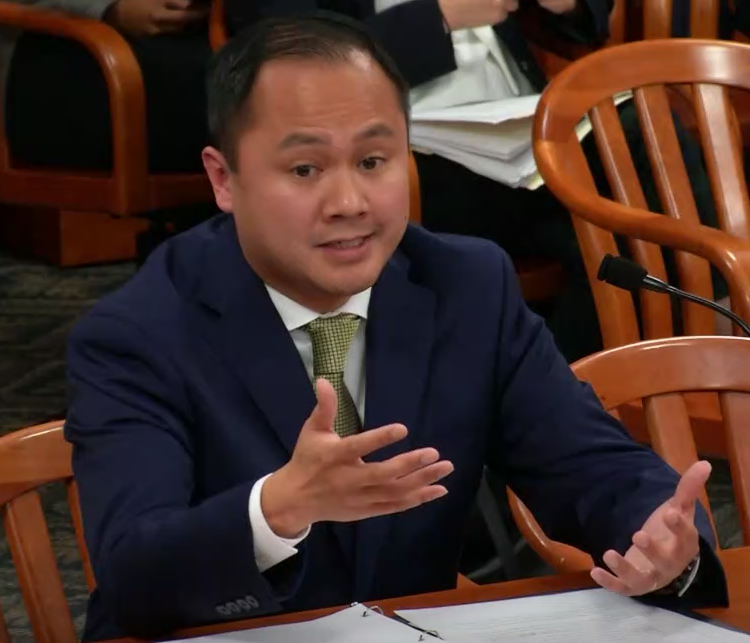On May 16, Armand Alacbay—ACTA’s Vice President of Trustee & Government Affairs—testified in front of the Michigan House Oversight Committee in support of House Bills 4435 and 4436. This legislation aims to protect the exercise of free speech and free assembly on the campuses of the state’s public universities and community and junior colleges.
 HB 4435 serves to clarify the rights and duties of students and staff at Michigan’s public colleges and universities. It allows public institutions to restrict expressive conduct only “to achieve a compelling governmental interest,” and even then only in ways which are “viewpoint and content neutral” and would leave open “ample alternative opportunities” for speech. HB 4436 asks each public institution to adopt policies that recognize the foundational relationship between higher education and the freedoms of expression and assembly. By echoing ideals found in the Chicago Principles of Freedom of Expression and the Kalven Report on the University’s Role in Political and Social Action, it would bring schools in line with best practices while respecting the American tradition of trustee governance.
HB 4435 serves to clarify the rights and duties of students and staff at Michigan’s public colleges and universities. It allows public institutions to restrict expressive conduct only “to achieve a compelling governmental interest,” and even then only in ways which are “viewpoint and content neutral” and would leave open “ample alternative opportunities” for speech. HB 4436 asks each public institution to adopt policies that recognize the foundational relationship between higher education and the freedoms of expression and assembly. By echoing ideals found in the Chicago Principles of Freedom of Expression and the Kalven Report on the University’s Role in Political and Social Action, it would bring schools in line with best practices while respecting the American tradition of trustee governance.
In his testimony, Mr. Alacbay noted that a recent Gallup poll found that 37% of college students believe that “shouting down a speaker to prevent his or her message from being heard is an acceptable tactic,” while “10% responded that violence could be acceptable in some circumstances.” Mr. Alacbay asserted that these bills would be effective “in establishing outer bounds on campus restrictions on expression that keep intact the spirit of academic inquiry.” HB 4436 in particular would ensure that “institutions play an affirmative role in promoting a culture of free expression consistent with their educational mandate.”
By defending free speech and intellectual freedom, the Michigan Legislature is laying the foundation for a culture of free expression that will remain for years to come.
View testimony here.
On May 16, Armand Alacbay—ACTA’s Vice President of Trustee & Government Affairs—testified in front of the Michigan House Oversight Committee in support of House Bills 4435 and 4436. This legislation aims to protect the exercise of free speech and free assembly on the campuses of the state’s public universities and community and junior colleges.
 HB 4435 serves to clarify the rights and duties of students and staff at Michigan’s public colleges and universities. It allows public institutions to restrict expressive conduct only “to achieve a compelling governmental interest,” and even then only in ways which are “viewpoint and content neutral” and would leave open “ample alternative opportunities” for speech. HB 4436 asks each public institution to adopt policies that recognize the foundational relationship between higher education and the freedoms of expression and assembly. By echoing ideals found in the Chicago Principles of Freedom of Expression and the Kalven Report on the University’s Role in Political and Social Action, it would bring schools in line with best practices while respecting the American tradition of trustee governance.
HB 4435 serves to clarify the rights and duties of students and staff at Michigan’s public colleges and universities. It allows public institutions to restrict expressive conduct only “to achieve a compelling governmental interest,” and even then only in ways which are “viewpoint and content neutral” and would leave open “ample alternative opportunities” for speech. HB 4436 asks each public institution to adopt policies that recognize the foundational relationship between higher education and the freedoms of expression and assembly. By echoing ideals found in the Chicago Principles of Freedom of Expression and the Kalven Report on the University’s Role in Political and Social Action, it would bring schools in line with best practices while respecting the American tradition of trustee governance.
In his testimony, Mr. Alacbay noted that a recent Gallup poll found that 37% of college students believe that “shouting down a speaker to prevent his or her message from being heard is an acceptable tactic,” while “10% responded that violence could be acceptable in some circumstances.” Mr. Alacbay asserted that these bills would be effective “in establishing outer bounds on campus restrictions on expression that keep intact the spirit of academic inquiry.” HB 4436 in particular would ensure that “institutions play an affirmative role in promoting a culture of free expression consistent with their educational mandate.”
By defending free speech and intellectual freedom, the Michigan Legislature is laying the foundation for a culture of free expression that will remain for years to come.
View testimony here.
WHO WE ARE
Launched in 1995, we are the only organization that works with alumni, donors, trustees, and education leaders across the United States to support liberal arts education, uphold high academic standards, safeguard the free exchange of ideas on campus, and ensure that the next generation receives an intellectually rich, high-quality college education at an affordable price.
Discover MoreSTAY INFORMED
Sign up to receive updates on the most pressing issues facing our college campuses.